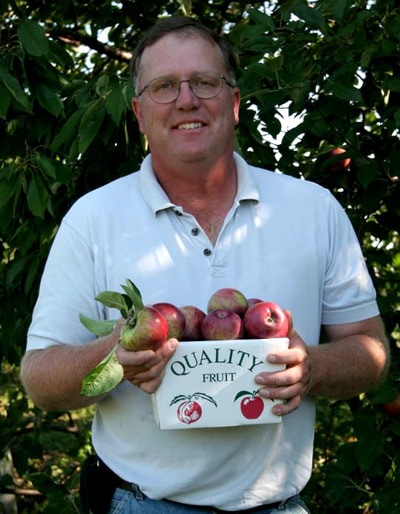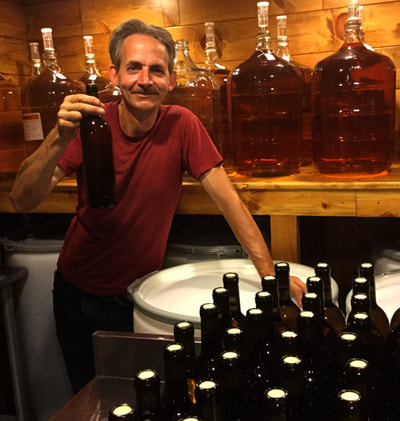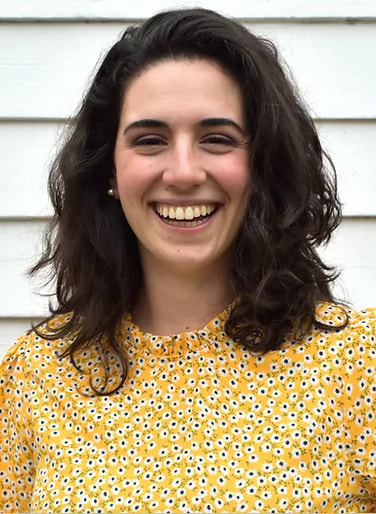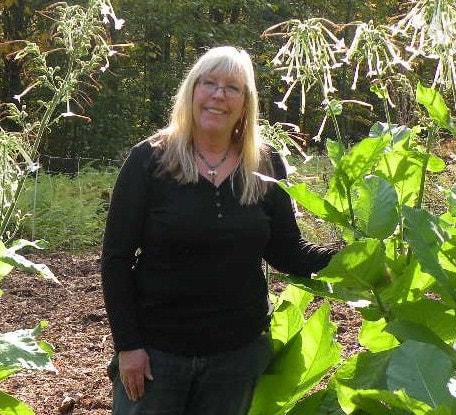 Apex Orchards has been owned and cared for by the same family for seven generations. The current owner, Tim Smith, has been back on the farm for 40 years. He is the current owner/operator on the farm. Abner Peck Sr., of the first generation of growers, arrived in Shelburne, MA from Lyme, CT in 1828 and purchased the land which is now known as Apex Orchards. He was a soldier in the American Revolutionary War and his ancestors arrived in the United States in 1634. The farm was originally a diversified farm as was typical for the era. The family raised cattle, sheep, horses and pigs. All of the fodder for the livestock was grown on the farm as were vegetables and apples for the family. Most of what was produced on the farm was used by the family. A small amount of meat, apples and dairy products were sold. Tim's great-grandfather, Austin L. Peck, added on a dairy operation and a large flock of chickens. The family sold both cream and eggs in the area. His grandfather, Lyndon Peck, didn't care much for dairying and he converted the farm to the orchards that we know today. The last dairy cows were sold in 1946 and the name of the farm was changed to Apex Orchards. The name was inspired because the orchard sits at the apex of a hill with a beautiful view where we grow spectacular fruit. Tim's parents continued expansion of the farm. Apex Orchards was originally a wholesale apple orchard selling apples across America and Europe. In the late 1990’s we moved into retail and have been supported by the help of our wonderful customers. In 2011 we purchased an additional 175 acres of land just up the road from our farm. This was part of the original Peck family farm from 1828 and we are glad to have it back in the family. It will give us and future generations the land to diversify and expand the farm. Today Apex Orchards grows a wide array of tree fruits, including apples, peaches, nectarines, apricots, quince, pears, Asian pears, blueberries and table grapes. We plan on adding additional fruit in the future. We pride ourselves in the diversity of fruit that we sell. We think you’ll be impressed too! Our fruit is sold in stores throughout the local area, at farmers markets, and of course, right at our farm store in Shelburne. Western Massachusetts is without a doubt one of the top fruit growing regions in the world. The soil, the micro-climate, and the varieties all combine to give our customers the best tasting fruit possible. We look forward to seeing you at the Amherst Farmers' Markets, in our local stores and at our Farm Store in Shelburne!
1 Comment
 Home Fruit Wine begins with a peach tree which David planted more than 20 years ago, in honor of his rescue dog Pearl. In 2011 Mother Nature was good to us and we had more peaches than we could ever eat so we made our first batch of wine. Well needless to say, I’ll admit, it was not our best. With help from Uncle Sonny, whom we have named our Blueberry wine in his honor, “Sonny’s Blueberry Sunrise," and lots of trial and error, we have learned the art, and may I add, FUN of Fruit wine making. David’s hobby of the fruit trees, which he planted and maintained, started to grow and became the catalyst for our Home Fruit Wine business! He calls is it his "miniature orchard!" We now have Blueberries, Raspberries, Rhubarb, many fruit trees and even Kiwi to work with! Our Wines are made with fresh succulent fruit and berries giving you a sweet natural taste. From David’s miniature orchard our fruit and berries are locally grown. What we don’t have we source from local farmers and friends to use in our collections. Home Fruit Wine was established in 2014 and we then opened our retail and tasting store in 2015. We have 42 different kinds of Fruit wines and Blends. We invite you to stop in for a tasting at our retail store at 382 South Main Street, Orange, MA and/or you can find us at one of the following locations to stock up for the festivities! 1) Amherst Farmers Market, Amherst, MA (Saturdays on the Amherst Common!) 2) Atkins Farm, Amherst, MA 3) Forest Park Farmers Market, Springfield MA 4) Patriot’s Package Store, Templeton MA 5) Smith’s Country Cheese, Winchendon, MA 6) Templeton Spirits, Templeton, MA 7) The Mill Moble, Gill, MA  It was a week before Christmas in 2018. Juliana was in the cantina of her nonna’s house, helping to cut up cured Italian prosciutto for the holiday. As she and her nonna were trimming off excess fat, her nonna said that her mother used to make their own soap, using fat saved from the animals on the farm. She would mix in bay leaves and lavender, giving them the faintest scent. The thought of making something that’s both crafty and useful stuck with Juliana over the winter. As a crafty person, she enjoys the process of making purposeful items, so on a cold day in February, she decided to attempt her first batch of soap, made from scratch. Many hours were spent researching the soap making process, but she felt ready to try it for herself. With many college-level courses and industry know-how behind her, she felt confident in the chemistry behind soap-making. Cold process soap making, utilized by Amherst Soaps, relies on a compound called sodium hydroxide, or lye, to split fat molecules. Overall, fat molecules are pretty stable, explaining why we can heat them so hot in cooking, so it takes a very strong molecule to break them apart. Lye happens to be the perfect fit. The process by which the lye breaks the fat is called saponification, resulting in soap! After this initial fat breakdown, the soap must be cured to allow the saponification reaction to complete. This curing period also allows the bars of soap to harden, ensuring they last in the shower. At Amherst Soaps, we cure our soaps for 4-6 weeks. We also generously super-fat our soaps, meaning we calculate for unreacted oils in our batter. This excess oil is what makes our soaps gentle and moisturizing for your skin. If every molecule of fat is reacted with lye, the soap is very harsh on skin, and is actually used as laundry soap! Because lye isn’t very friendly to fats, it can be dangerous in its raw form. Originally, Juliana wanted to make soap with the students she taught, as a way to learn about chemical reactions, but given lye’s danger, she did it as a demo instead. The students were more than thrilled seeing a useful chemical reaction and were also satisfied with melt and pour glycerin soaps to make their own instead. Since Juliana began selling soaps as Amherst Soaps in May 2019, she has also become quite the businesswoman. This was her first venture into the business world, and although Amherst Soaps is still quite small, it has provided her with countless business lessons ranging from simple bookkeeping to photography. In early 2020, Juliana made Amherst Soaps into a fully functioning LLC as a way to increase her wholesale base and to create a website, amherstsoaps.com. Now, customers can find soaps in many retail locations in the valley, or online! Regardless of her business adventures, Juliana and Amherst Soaps has a commitment to local. Impressed by the local food scene in the valley, Juliana realized many of her ingredients could be sourced from the area. This meant not only a gentle, handmade soap, but one that reduced its carbon footprint and supported the community as well. Currently, Amherst Soaps strives to include local products in each bar of soap. Most of the time, this is creamy, hand-rendered lard from other vendors of the Amherst Farmers' Market such as, GO Farm in Hatfield, or thick, golden honey from Quaboag Trading Co. in West Brookfield. Even better, both of these are found on Saturdays at the Amherst Farmers Market as well! Truly local goods being used in great-for-your-skin soaps. Amherst Soaps can be found on alternating weekends at the Amherst Farmers Market, or at many farm stands and stores in the Amherst-Hadley area. For a full list of soaps we offer, local businesses we source from, and all retail locations, check out our website, AmherstSoaps.com!  Community Herbalist Carol Joyce of White Buffalo herbs has been growing and learning about herbs for many years. Though born in northeastern MA, she has strong roots in Western MA-her dad was born in Pittsfield & she graduated from MT Holyoke College, in South Hadley. Carol has lived all along the east coast on her sailboats & in Great Britain. She is a Social Worker/Therapist in private practice, a Community Herbalist, & now lives on her Still Willin’ Organic Farm & Botanical Sanctuary in Warwick, MA. She even was the caretaker of an uninhabited island (Soldier Key) in the Florida Keys, lived aboard sailboats for 15 years, earned her Captains license and chartered her 3-masted, wooden, gaff-rigged schooner, “Zeeto” for years in Boston Harbor. Originally Carol started White Buffalo Herbs at her Twin Brook Organic Farm in New Salem. She grew & sold 100’s of medicinal herb plants and eventually started making value-added herbal products. She started selling just 10 of her hand-made items at the Amherst Farmers Market as a temporary, stand-by vendor over 30 years ago. Each week she would bring a wheel barrow & table w/umbrella to set up in the middle line of the market, when it was allowed, at the Spring Street parking lot. Each week she’d wait for the ok from the market manager to set-up, since the market was so full and busy it only allowed set-up for other farmers, when someone was out. Finally she became a full-time farmer/vendor at the Amherst Farmers Market & remains so til today. Eventually, Carol & her husband Marty Vogt purchased 124 acres of remote, mountainous woodland in Warwick, MA & moved there in 2000. It had been a cow farm in the 1700’s but was totally wooded, steep, and had no roads or buildings on the site. Together they built a 20-sided round house, the bottom half of which is dedicated to White Buffalo Herbs. Except for the foundation, Carol & Marty built this entire home and farm with only their own 4 hands…no cranes, no contractors, no neighbors aid. Because Carol never takes “No” for an answer & is very determined, the clearing and building was grueling and rewarding, and Carol can truly say “We built our farm, by ourselves! They are “Still Willin’ “ to work hard on this wonderful new farm and have put it into a conservation restriction, so no more homes can be built on this wilderness. They built a steep ½ mile driveway (truly!) up to the highest point on the property (it is so high up that the weather is vastly different than in the surrounding towns & a nightmare in winter), lived without power or water for 4 years while building their dream farm, were surrounded by amazing flora and fauna (bear, moose, deer, porcupine, so many trees & wild herbs), met wonderful people, and were “helped” by their cat “Lenny” now replaced after 18 years with 2 rambunctious kitties. Carol continues to learn about herbs and the Green World around her. She holds an annual Apprenticeship on the farm and offers many other classes. She grows a variety of mostly Native American herbs and uses Native American formulas. She named her herbal farm company to honor the Lakota story of White Buffalo Woman, or Ptesan-Wi: It is said that White Buffalo Woman appeared many ages ago with sage leaves & a medicine bundle in her hands. She shared her knowledge of the precious gifts of herbs with her people: sweet grass for purification, boiling corn for food, making dried pemmican, cooking over a hearth, and the gift of prayer. She showed them how to use a pipe which contains the gift of peta-owihankeshni (or flame) that can be passed from generation to generation. As she prepared to leave them, she said that the four ages of Creation were in her and that she would return to them one day, when people needed prosperity again. Once she saw she was no longer needed, she left rolling over four times. The 1st time she turned into a black buffalo, heading North; the 2nd time she turned into a brown buffalo, heading South; the 3rd time she turned into a red buffalo heading East; and after rolling a 4th time, she headed WEST, turning into a White female Buffalo calf-believed by the Lakota to be the most sacred living thing on can behold. Carol thought that by naming her farm business “WHITE BUFFALO HERBS”, she could continuously honor White Buffalo Woman and her commitment to creating a healthy community. Meaning no disrespect to our Native American Community, she cherishes White Buffalo Woman’s vision and hopes to empower others to create their own good health in their communities. As always, Carol strives to create new products that will be helpful to her community. She keeps her prices lower than most herb stores to help all folks be able to afford organic herbals. Carol now makes over 120 herbal products, herself, and attends 2 farmers markets each week: Forest park in Springfield on Tuesdays and Amherst Farmers’ Market every Saturday since long, long ago. White Buffalo herbs products are available in person at the farmers markets or online at www.whitebuffaloherbs.com Carol can be reached directly via the internet at [email protected] This season, during the Covid-19 pandemic, Carol is pleased to be offering her effective, sweet smelling (non-Aloe) GERM RELIEF Hand Sanitizer at the Main tent entrance to the Amherst Farmers Market each week. Dedicated staff will spray your hands as you come in to the market. Come by Carol’s White Buffalo Herbs’ tent in Amherst to browse her traveling HERB APOTEHCARY SHOP & have a chat… |
AFM Marketblog
Bringing you organic, grass-fed, pasture-raised, locally-sourced blog posts on a semi-weekly basis from the Amherst Farmers' Market. Archives
July 2022
categories...
All
|
 RSS Feed
RSS Feed
